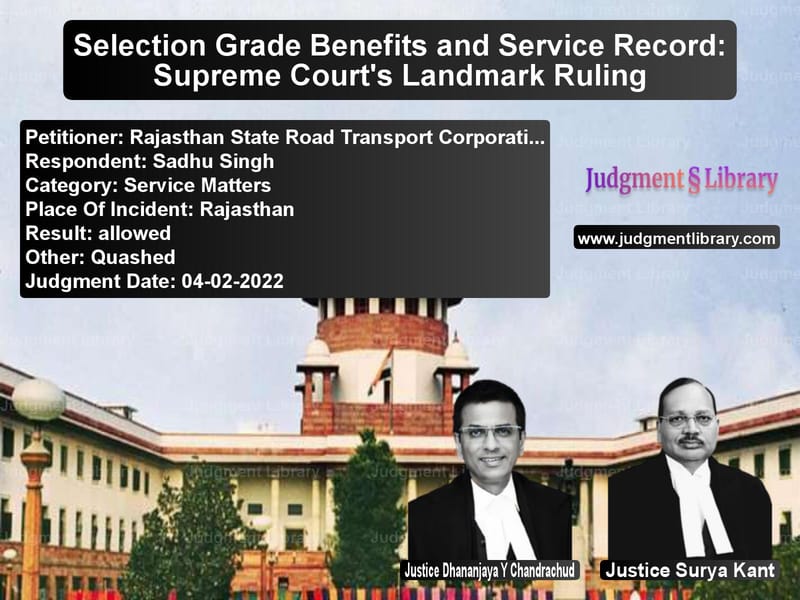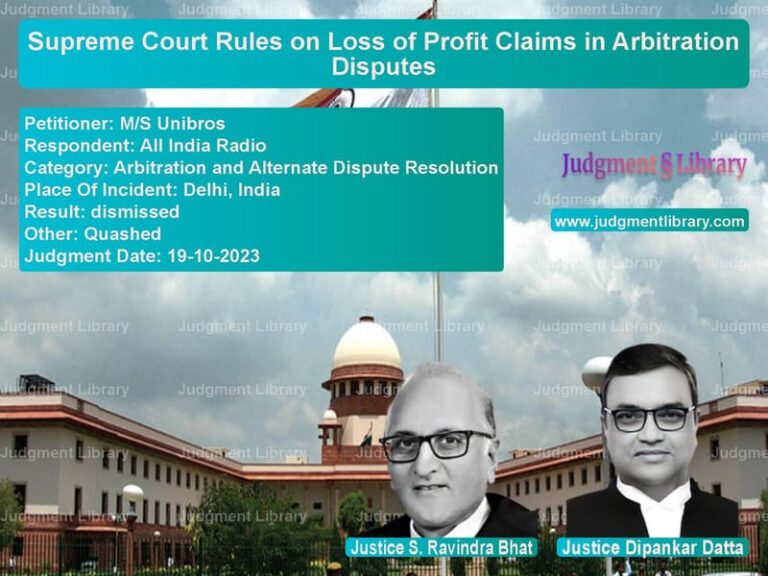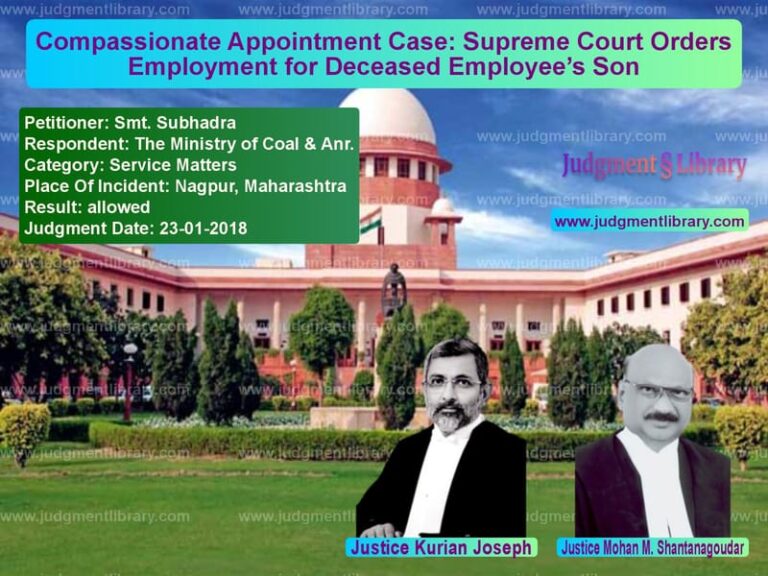Selection Grade Benefits and Service Record: Supreme Court’s Landmark Ruling
The Supreme Court, in Rajasthan State Road Transport Corporation vs. Sadhu Singh, ruled on a crucial issue related to the grant of Selection Grade benefits to government employees. This case revolved around whether an employee with multiple disciplinary proceedings and penalties could claim Selection Grade benefits after retirement. The judgment clarifies the importance of a clean service record for eligibility.
Background of the Case
The respondent, Sadhu Singh, was appointed as a Conductor by the Rajasthan State Road Transport Corporation (RSRTC). On 25 January 1992, the Rajasthan Finance Department issued an Office Order granting the benefit of Selection Grade to employees upon completion of 9, 18, and 27 years of service. This order applied to RSRTC employees as well.
The respondent was compulsorily retired from service on 4 January 2003 due to multiple disciplinary proceedings. Despite this, in 2010—seven years after retirement—he filed a suit claiming Selection Grade benefits. The trial court ruled in his favor, directing RSRTC to grant him the Selection Grade for completing 9 and 18 years of service. RSRTC challenged this ruling in higher courts, arguing that his disciplinary record made him ineligible.
Arguments by the Parties
Petitioner’s Arguments (RSRTC)
- The suit was time-barred as it was filed seven years after retirement, exceeding the three-year limitation under the Limitation Act, 1963.
- The respondent had 19 charge-sheets during his service tenure, resulting in multiple penalties, including salary reductions and withheld promotions.
- According to the Selection Grade policy, only employees with a clean service record were eligible for benefits.
- The trial court failed to consider that Selection Grade was a discretionary benefit, not an automatic right.
Respondent’s Arguments (Sadhu Singh)
- The trial court correctly ruled in his favor, as his claim was filed after his representation for benefits was rejected in 2010.
- Compulsory retirement is not a penalty, and he was still entitled to Selection Grade.
- RSRTC failed to prove that all 19 charge-sheets were valid and justified.
Supreme Court’s Key Observations
1. Limitation Period for Filing the Claim
The Supreme Court ruled that the suit was barred by limitation:
“The respondent waited for seven long years after his retirement to pursue a claim for Selection Grade. This was clearly beyond the residuary period of limitation of three years provided in Article 137 of the Schedule to the Limitation Act, 1963.”
2. Clean Service Record as an Eligibility Condition
The Court cited Clause 7 of the 1992 Office Order, which states that Selection Grade is granted only to employees with a satisfactory service record:
“Only those employees whose service record has been satisfactory and are otherwise eligible for promotion on the basis of seniority but have not been able to get the same due to the absence of promotional channels shall be considered for Selection Grade.”
The Court emphasized that the respondent’s record was far from satisfactory, given the numerous disciplinary actions against him.
3. Nature of the Disciplinary Actions
The Supreme Court examined the respondent’s service record and found that:
- He had been issued 19 charge-sheets over the years.
- His penalties included suspensions, salary reductions, and multiple instances of withheld pay increments.
- Such disciplinary history demonstrated that his service record was not “clean.”
“The respondent had been subjected to several disciplinary proceedings, and as many as 19 charge-sheets were issued against him, which resulted in penalties of a varying nature. The service record of the respondent cannot be regarded as untainted or clean.”
4. Withholding of Pay Increments and Its Effect
The respondent argued that some of the penalties were not severe. However, the Court clarified that even non-cumulative penalties affect service records:
“Even if the withheld increments were restored later, the imposition of the penalty itself indicates that the service record of the employee was not satisfactory.”
5. Selection Grade Is Not a Right
The Supreme Court held that Selection Grade is not an entitlement but a benefit subject to discretion and eligibility conditions:
“The grant of the Selection Grade is not a matter of right and was subject to the terms and conditions stipulated. The respondent failed to fulfill these terms and conditions.”
Final Judgment
The Supreme Court ruled as follows:
- The appeal by RSRTC was allowed.
- The judgments of the lower courts were set aside.
- The respondent’s suit for Selection Grade benefits was dismissed.
Impact of the Judgment
This ruling has significant implications for government employees:
- Reinforces service record requirements: Employees must maintain a clean record to qualify for discretionary benefits like Selection Grade.
- Clarifies limitation in service matters: Legal claims must be filed within the prescribed time frame; delays weaken a case.
- Prevents abuse of judicial remedies: Employees with multiple disciplinary actions cannot claim special treatment.
- Ensures fair implementation of selection policies: Benefits should be awarded based on merit and service history, not sympathy.
The Supreme Court’s decision strengthens the principle that public sector benefits must align with performance and disciplinary records. This ruling sets a clear precedent for government employment disputes related to Selection Grade and other service-related benefits.
Petitioner Name: Rajasthan State Road Transport Corporation.Respondent Name: Sadhu Singh.Judgment By: Justice Dhananjaya Y Chandrachud, Justice Surya Kant.Place Of Incident: Rajasthan.Judgment Date: 04-02-2022.
Don’t miss out on the full details! Download the complete judgment in PDF format below and gain valuable insights instantly!
Download Judgment: rajasthan-state-road-vs-sadhu-singh-supreme-court-of-india-judgment-dated-04-02-2022.pdf
Directly Download Judgment: Directly download this Judgment
See all petitions in Pension and Gratuity
See all petitions in Public Sector Employees
See all petitions in Judgment by Dhananjaya Y Chandrachud
See all petitions in Judgment by Surya Kant
See all petitions in allowed
See all petitions in Quashed
See all petitions in supreme court of India judgments February 2022
See all petitions in 2022 judgments
See all posts in Service Matters Category
See all allowed petitions in Service Matters Category
See all Dismissed petitions in Service Matters Category
See all partially allowed petitions in Service Matters Category







